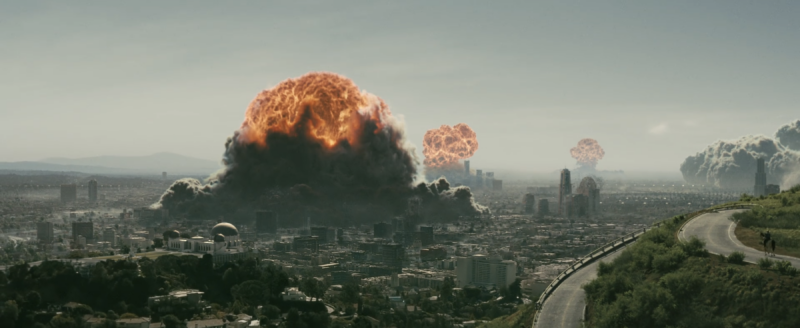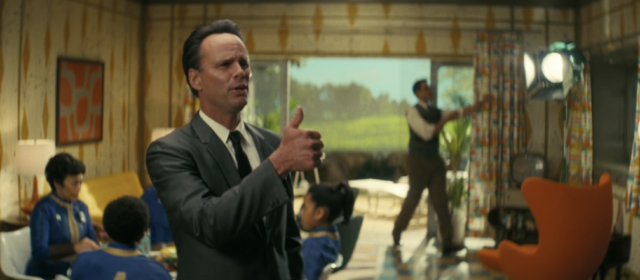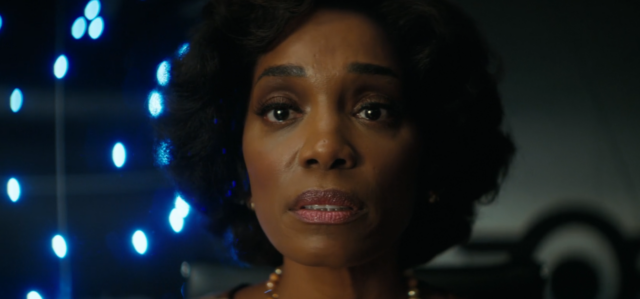
It's been just over a week since the Fallout TV series premiered on Amazon Prime, and one thing's for sure: It's a huge hit. You can hardly open a social media app without seeing content about it, the reviews are positive, and the active players for the Fallout games have doubled over the past week.
A few days ago, I shared some spoiler-free impressions of the first three episodes. I loved what I'd seen up to that point—the show seemed faithful to the games, but it was also a great TV show. A specific cocktail of tongue-in-cheek humor, sci-fi campiness, strong themes, great characters, and visceral violence really came together into a fantastic show.
Still, I had some questions at that point: Would the franchise's penchant for satire and its distinct political and social viewpoint come through? Where was all this headed?
Like a lot of us, I've now finished the series. So if you have, too (or if you haven't but just don't care about spoilers), it's time to dive into all eight episodes of season one together.
I'm a long-time Fallout fan, so I'll focus on how the show ties in with the games, but like the show itself, I aim to make this interesting even for the newbies.
Heavy spoilers for Fallout season one start here, as well as a few spoilers about Fallout New Vegas and Fallout 4.
Something for everybody
So was the show as good after eight episodes as it was after three? Absolutely. If anything, the show only got better as it progressed. The more inducted into the world, lore, and characters new viewers became, the more effective the show could be.
There was a lot to set up, after all. Some of us have been playing the games for years, so we knew all about Vault-Tec, the Brotherhood of Steel, the Enclave, the New California Republic, Pip-Boys, gulpers, and ghouls. But if you're coming into the world fresh, that's a lot to take on.
AdvertisementI was worried while watching that despite the show's efforts to introduce new viewers, it might not be good enough, but I've been told by multiple people who haven't played the games that they didn't have trouble keeping up.
Once the various elements were established, the show was able to hit its stride and start bringing in the aspects of Fallout that weren't prominent in the opening stretch.
Further, it expertly walked the line to give established fans something to chew on at the same time. The timeline of Fallout lore and stories spans hundreds of years, but the TV show is actually set after all of the games.
| Event | Year |
|---|---|
| Bombs Drop | 2077 |
| Fallout 76 (2018) | 2102 |
| Fallout (1997) | 2161 |
| Fallout 2 (1998) | 2241 |
| Fallout 3 (2008) | 2277 |
| Fallout New Vegas (2010) | 2281 |
| Fallout 4 (2015) | 2287 |
| Fallout Season 1 (2024) | 2296 |
That meant the show revealed some things about what happened to certain factions and places that previously appeared in the games. Most notably, Shady Sands is a crater, and the New California Republic—one of the most important factions and one of the strongest governments from the games—no longer exists as we knew it.
That led some fans to speculate that TV series executive producer and game creative director Todd Howard was trying to make the popular New Vegas game (which was not made by his team) non-canon, but in a recent interview, he clarified that both the show and New Vegas are very much canon, noting that the bomb fell on Shady Shands very shortly after the events of that game. The timeline on the show is cutting it close, but a generous interpretation allows it all to line up.
Of course, the show expanded on some elements from the games in ways that could be seen as breaching canon. You could write most of them away as things the games never addressed—like the vials ghouls must consume to avoid going feral or the origin story of gulpers. The games at times implied different things about both of those aspects, but they didn't necessarily contradict them.
AdvertisementThe series also canonized some specific choices that players could make in some prior games. For example, it's confirmed that the Brotherhood of Steel airship seen in the show is the same one seen in Fallout 4, meaning that the canon outcome for Fallout 4 is obviously not one where that airship was destroyed. (Players of that game had the option of pursuing paths that led to its destruction or not.)
- Shady Sands as it's seen in the show.Amazon
- New Vegas is teased as the next destination.Amazon
- The last moments had a brief tease with what appears to be a Deathclaw skull, too.Amazon
With minimal exceptions, previous games in the series avoided canonizing outcomes like that by being set decades or even centuries (as well as hundreds or even thousands of miles) apart—such that it wasn't necessary to reveal what happened in those cases. Since this show is set in a region that is well-documented in prior Fallout titles, that's not the case here.
The tease that we're going to New Vegas next season probably means that several multiple-choice outcomes from that game will have to be canonized, too. Is Mr. House still running the show? What happened to Caesar's Legion? Why does New Vegas look so bombed out compared to how it appeared in the game? We'll probably find out.
All told, new fans got to explore the world of Fallout for the first time, even as longtime fans got to see where the story has gone since they last played the games. The story hadn't been moved forward in nine years, since 2018's Fallout 76 was actually a prequel that took place long before any of the other games in the series.
It took some skillful work to serve both of those audiences without compromising the experience of the other, so kudos to the show's writers.
Fallout still has a point of view
The first three episodes were funny, and there were subtle hints that the show might have something more serious to say later on, but it started out as a character drama with some dark humor and graphic action sequences. On their own, those elements made for entertaining viewing, but there has always been more to Fallout.
Fallout has a point of view and strong themes in its satirical take on American culture.
The TV series does those themes justice by the end. It's unfortunately uncommon for adaptations of this nature to so carefully preserve the themes of the source material. Often, they only replicate what's on the surface. That's not so for Fallout's first season, and that's one reason it's one of the best game adaptations ever made.
There was subtext in those first few episodes. It was pretty clear that companies like Vault-Tec weren't necessarily on the up-and-up, and there's no love reserved for an old world that was so dysfunctional it walked right off the cliff to an apocalypse.
That was all expanded upon as the show progressed. We learned specifically who dropped the first bomb in the nuclear holocaust. I could be wrong since it's been years since I've played some of the games, but I always thought there were hints but never conclusions on that front, other than the fact that the nukes went off in a conclusion to the Resource War between the US and China.

We learned that Vault-Tec led the way, together with companies like RobCo. The goal was to win the market by outliving the competition. Nuke the world, preserve your brand, resources, and values in a network of vaults, and you come out in charge in the end. It's absurd, of course, but that's what satire's all about.
It didn't really all go the way Vault-Tec wanted, but the final episode sets up the corporate executives who destroyed the world (and Shady Sands, later) as its central villains going into future seasons.
But don't for a second think that Fallout's point of view is one of self-righteous moralizing. By the end of the season, you have at least one big reason to hate every faction, all of which are deeply flawed in their visions of what the future world order should look like or how to achieve it.
AdvertisementThat's usually the situation in the Fallout games, which are ultimately quite nihilistic, at least where both institutions and movements are concerned. The satire lampoons people in power, but it also looks unkindly some of the moralistic activists who aim to unseat them. In the end, power, power's pursuit, and the trappings of ideology and social dynamics corrupt everyone, and you can't trust any of it—at least not at that organizational level.
In groups—whether we're talking about cynical American corporations or governments, communist governments across the sea, anti-capitalist activists meeting in secret in Hollywood, or the Brotherhood of Steel—people are compromised at best and monsters at worst.
However, you can and should form strong bonds of trust, friendship, and hope with individuals. Those were all themes in the game. They're just as strong here.
War... war never changes
When the series began, I was ready to kneejerk and complain that it didn't start with the words "war... war never changes" like so many of the games did. But in the end, I'm happy with what the showrunners did instead.
The line is uttered, but it happens in the very last episode, and it's spoken at the most important moment of revelation and emotional impact in the season.
It was a perfect capstone to eight hours of rigorously honoring the source material, even though the show introduced or revised some concepts for the story.

I love the fact that this show focuses on three different characters in equal measure, each of them embodying a type of character a player of Fallout might create. Lucy is the do-gooder vault dweller, Maximus is the aspirant warrior, and The Ghoul is the wasteland rogue.
Through those characters, the show really captures the full range of the Fallout experience. Too many shows seek to make it all about the plot, but their characters don't really pop. Those characters often exist as plot devices, not as fleshed-out people. Better shows start with the characters, and what we see happen in the plot seems to naturally come from the characters' personalities, values, words, and actions. Fallout is the latter.
I can talk about faithfulness to the themes all day, but the characters are ultimately what makes the show great. I can't wait for season two.
Let's find out what happened to New Vegas.


















